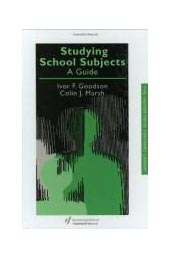Studying School Subjects: a guide
Conclusions, Complexities and Conjectures
As we have seen, the legitimising institutions together with established and indeed aspiring subject groups share the vested interest in the belief that 'a scholarly discipline' is needed if a school subject is to be granted high status. The stranglehold of the academic tradition has seldom been seriously threatened by its overwhelming need to shun 'practical utility'. The theme which Dodd points to was just as common when the 1904 regulations were established. A contemporary noted that the school curriculum was 'subordinated to that literary instruction which makes for academic culture, but is of no practical utility, to the classes for whom the local authorities should principally cater[i].
The dominance of the academic tradition is patently supported by the major vested interest groups within education and the broader society. Yet the very need for academic subjects to escape from the allegations of 'practical utility' may yet lead to irresistible pressure for change in the period of economic malaise which we currently confront.
The studies in this book show clearly that school subject groups tend to move progressively away from concerns with 'utilitarian' or 'relevant' knowledge. High status in the secondary school curriculum is reserved for abstract theoretical knowledge divorced from the working world of industry and the everyday world of the learner. As we have seen this is not coincidental. The very price of success in achieving high status in an academic discipline is to renounce practical connections and relevance to the personal and to the industrial and commercial world. To these high-status academic subjects go the main resources in our educational system: the better qualified teachers, the favourable sixth form ratios and the pupils that are deemed most able. Hence the main flow of financial support in our school curriculum is invested in those subjects which have promoted themselves as academic disciplines. In short the politics of curriculum, the process of becoming a high-status subject and discipline, ensures that most money in education is invested in subjects which stress their divorce from practical relevance and the industrial and commercial world. As a formula for economic decline such a pattern of curriculum negotiation and investment could hardly be perfected.
Economic disfuctionality is, however, not the only indictment. As a formula for the education of a mass clientele the system is similarly diametrical in its misdirection. We have noted that Layton sees the academic tradition as the prelude to disenchantment for most pupils. Hemmings has likewise inveighed against the 'academic illusion', which he says 'bristles with anti-educational consequences'[ii]. There is indeed a good deal of evidence that the academic subject is profoundly unsuitable for many pupils, specifically those from working-class backgrounds. For instance Wit kin has shown how working-class pupils actively prefer and choose lessons they can relate to the everyday world[iii]. The teachers of such pupils constantly confirm this view; their mode 3 CSE syllabuses devised for these pupils provide documentary proof that they judge practical relevance to be the best motivational material for 'average' and 'below average' pupils. Unfortunately school teachers have career interests as well as classroom interests. As we have seen the former may subjugate the latter: the pursuit of academic status whilst providing the gateway to career success for the teacher simultaneously inaugurates the prelude to disenchantment for his pupils.
[i] Quoted in Banks, 'Parity and Prestige', p. 41.
[ii] J. Hemmings 'The Betrayal of Youth' (London, Marion Boyars, 1980).
[iii] B. W. Witkin, Social Class Influence on the Amount and Type of Positive Evaluation of School Lessons, 'Sociology', Vol. 5, No. 2, 1971.
